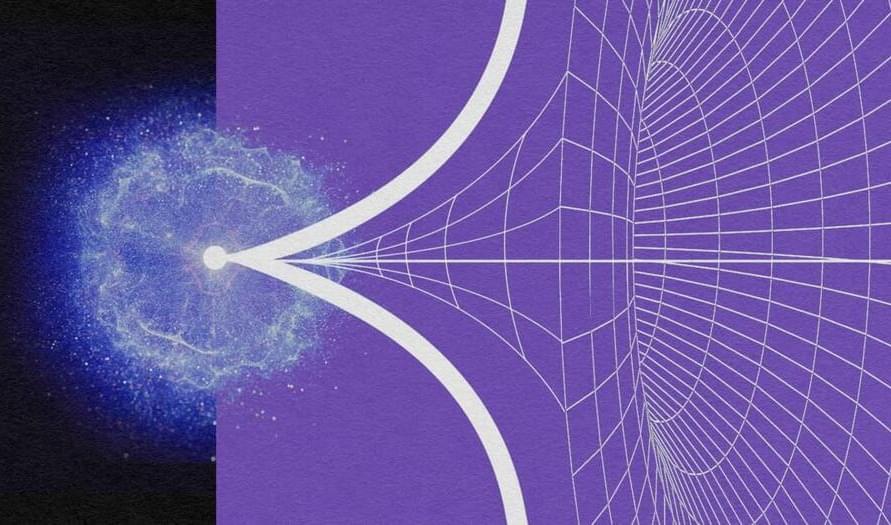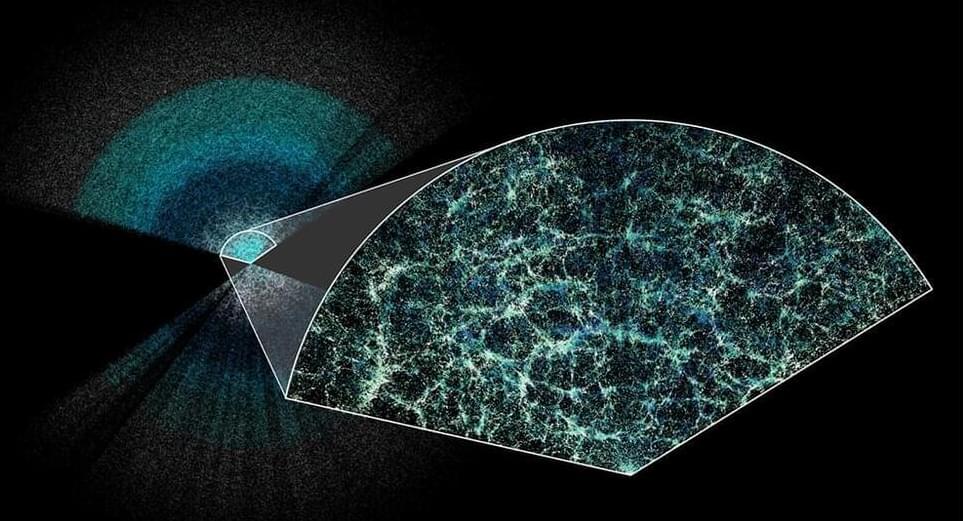Apr 6, 2024
Ambitious new dark matter-hunting experiment delivers 1st results
Posted by Dan Breeden in category: cosmology
The new BREAD experiment, which was designed to search the cosmos for mysterious dark matter, has returned its first results.
The new BREAD experiment, which was designed to search the cosmos for mysterious dark matter, has returned its first results.
Stephen Hawking and Jacob Bekenstein calculated the entropy of a black hole in the 1970s, but it took physicists until now to figure out the quantum effects that make the formula work.
By Leah Crane

But when it comes to the origin of the Universe, we don’t know what forces are at play. We actually can’t know, since to know such force (or better, such fields and their interactions) would necessitate knowledge of the initial state of the Universe. And how could we possibly glean information from such a state in some uncontroversial way? In more prosaic terms, it would mean that we could know what the Universe was like as it came into existence. This would require a god’s eye view of the initial state of the Universe, a kind of objective separation between us and the proto-Universe that is about to become the Universe we live in. It would mean we had a complete knowledge of all the physical forces in the Universe, a final theory of everything. But how could we ever know if what we call the theory of everything is a complete description of all that exists? We couldn’t, as this would assume we know all of physical reality, which is an impossibility. There could always be another force of nature, lurking in the shadows of our ignorance.
At the origin of the Universe, the very notion of cause and objectivity get entangled into a single unknowable, since we can’t possibly know the initial state of the Universe. We can, of course, construct models and test them against what we can measure of the Universe. But concordance is not a criterion for certainty. Different models may lead to the same concordance — the Universe we see — but we wouldn’t be able to distinguish between them since they come from an unknowable initial state. The first cause — the cause that must be uncaused and that unleashed all other causes — lies beyond the reach of scientific methodology as we know it. This doesn’t mean that we must invoke supernatural causes to fill the gap of our ignorance. A supernatural cause doesn’t explain in the way that scientific theories do; supernatural divine intervention is based on faith and not on data. It’s a personal choice, not a scientific one. It only helps those who believe.
Continue reading “The Big Bang’s mysteries and unsolvable ‘first cause’ problem” »

DESI Survey announces the most precise measurements of our expanding #universe using the BAO signal in 6.1 Million #galaxies and #Quasars from Year 1, tracing dark energy through cosmic time.
With 5,000 tiny robots in a mountaintop telescope, researchers can look 11 billion years into the past. The light from far-flung objects in space is just now reaching the Dark Energy Spectroscopic Instrument (DESI), enabling us to map our cosmos as it was in its youth and trace its growth to what we see today. Understanding how our universe has evolved is tied to how it ends, and to one of the biggest mysteries in physics: dark energy, the unknown ingredient causing our universe to expand faster and faster.
A generation of physicists has referred to the dark energy that permeates the universe as “the cosmological constant.” Now the largest map of the cosmos to date hints that this mysterious energy has been changing over billions of years.
“Gravity pulls matter together, so that when we throw a ball in the air, the Earth’s gravity pulls it down toward the planet,” Mustapha Ishak-Boushaki, a professor of physics in the School of Natural Sciences and Mathematics (NSM) at UT Dallas, and member of the DESI collaboration, said in a statement. “But at the largest scales, the universe acts differently. It’s acting like there is something repulsive pushing the universe apart and accelerating its expansion. This is a big mystery, and we are investigating it on several fronts. Is it an unknown dark energy in the universe, or is it a modification of Albert Einstein’s theory of gravity at cosmological scales?”
DESI’s data, however, shows that the universe may have evolved in a way that isn’t quite consistent with the Lambda CDM model, indicating that the effects of dark energy on the universe may have changed since the early days of the cosmos.
“Our results show some interesting deviations from the standard model of the universe that could indicate that dark energy is evolving over time,” Ishak-Boushaki said. “The more data we collect, the better equipped we will be to determine whether this finding holds. With more data, we might identify different explanations for the result we observe or confirm it. If it persists, such a result will shed some light on what is causing cosmic acceleration and provide a huge step in understanding the evolution of our universe.”
The weird, faint star system—the tiniest Milky Way satellite ever found—could be under the influence of dark matter.
The 3,200-megapixel LSST camera is the size of a compact car and weighs in at 3 metric tons, which is about half the weight of a male African bush elephant. The LSST’s wide-field view will attempt to solve lingering mysteries surrounding dark energy, the force that accounts for around 70% of our universe’s matter-energy content and causes the expansion of the cosmos to accelerate.
The LSST will also investigate dark matter, the mysterious substance that accounts for around 85% of all stuff in the cosmos despite being invisible to us, as well as answer other astronomical questions as it creates what Željko Ivezić, Director of Rubin Observatory’s construction, describes as the “greatest movie of all time and the most informative map of the night sky ever assembled.”
